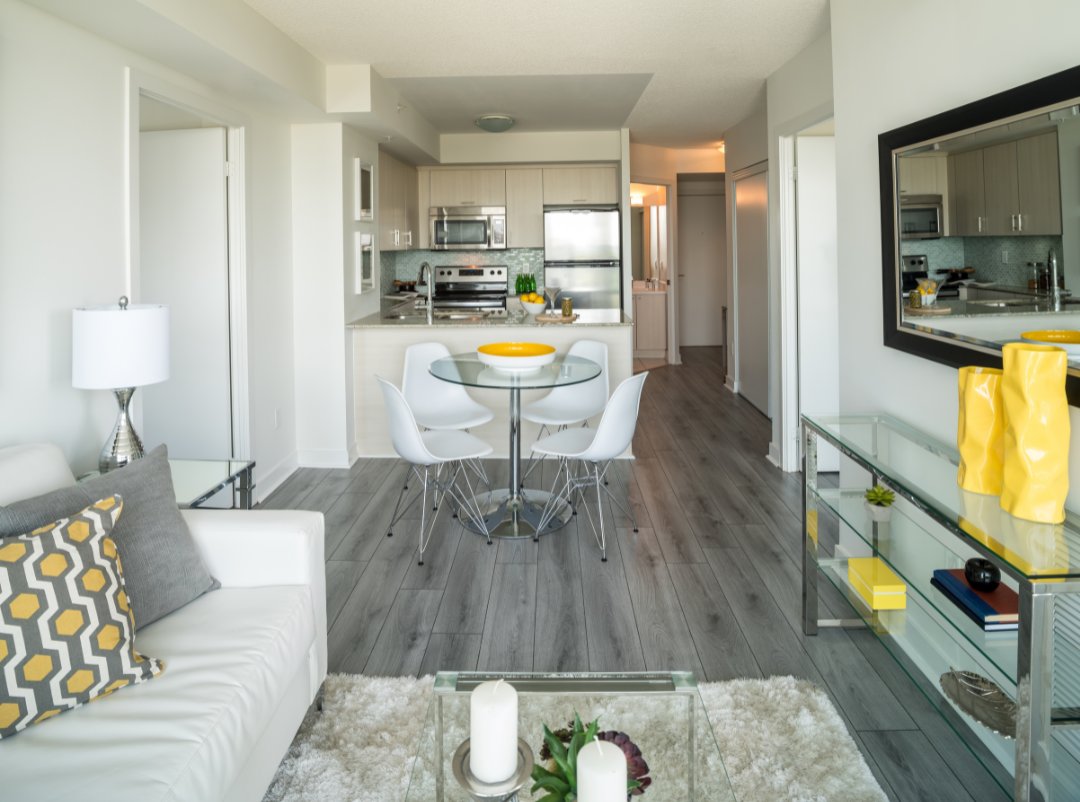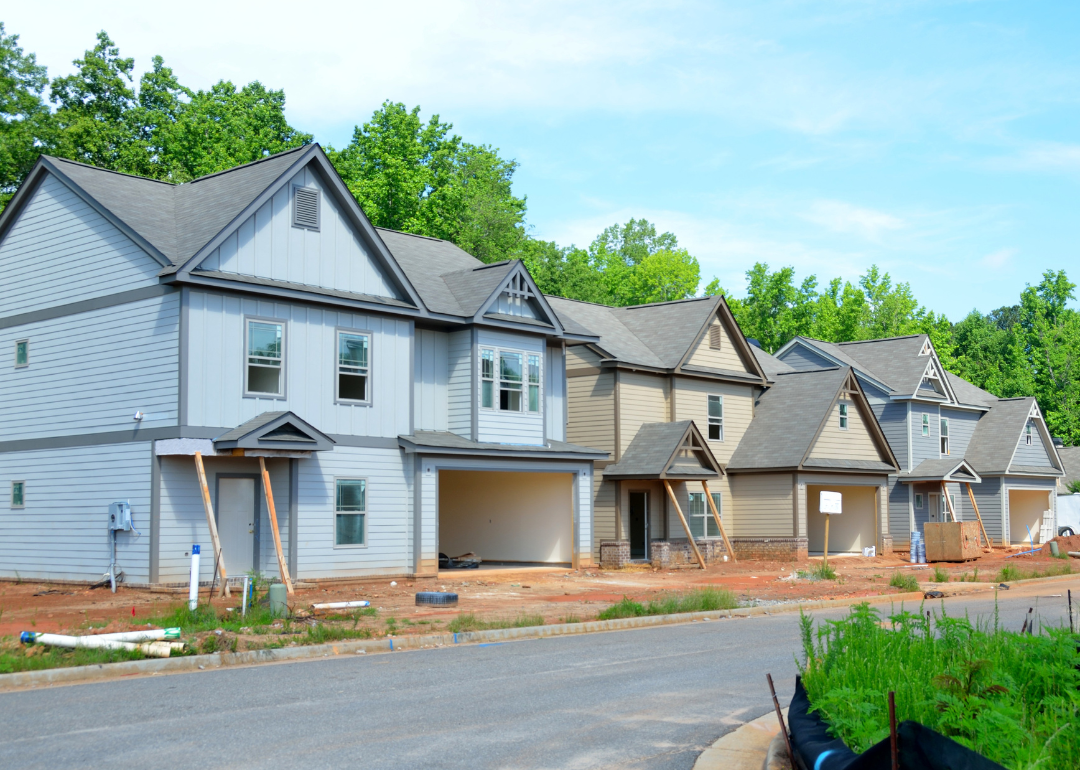Do you choose the resale market or opt for a pre-construction home? When you are in the market to buy a home, it is an important consideration. There is no doubt that pre-construction homes have a certain appeal to homebuyers.
Buying brand new provides the opportunity to own a home that no one else has ever lived in. And because the house is in the pre-construction phase, you have the opportunity to customize it to your preferences.
If pre-construction is something you’re considering, here’s the 411 to help you decide if it really is for you.
What is a Pre-Construction Home?
A pre-construction home is exactly what it sounds like, a house you buy before constructed. Most styles of homes are available for pre-construction buying, including:
- High-rise condos
- Low-rise condos
- Detached houses
- Semi-detached houses
- Townhouses
For a condo development, you’ll buy a home from blueprints or a 3D computer rendering that provides a simulated walk-through. For houses, you can usually visit a model home that sits on the lot of the future development. Although model homes tend to be highly aspirational in their decor, it’s your chance to get a more realistic look at what you’ll be buying.

The Benefits of Pre-Construction Homes
So, what’s the big attraction of a pre-construction home? There are quite a few benefits, including:
Warranty
Like buying a new car, a brand new home comes with a warranty. The warranty programs in Canada offer protection for newly built homes, including delays in occupancy and closing coverage, protection for your deposit, and the cost of repairs should there be issues once you move in.
Lower Price Tag
Pre-construction homes can offer better value than the resale market, because you’re essentially buying a promise. You put down your deposits (as per your purchase agreement), and the builder promises to deliver a home by a specified date.
No Bidding Wars
Depending on where you’re shopping for your home, bidding wars can really knock up the price. When inventory is low, buyers are desperate, and the more attractive the home and neighbourhood, the more chance you could end up paying an inflated price for a resale home. When it comes to pre-construction, you’re looking at a set price. You’ll know exactly how much you’ll be paying, usually at fair market value.
Designer Home
You have the option of designing your home with plenty of upgrades available. There are not only got upgrades for finishings like kitchen counters and flooring, but you can often make structural upgrades, including adjusting some floor plan options.
Because you’re making all your decisions during the building process, they are far more affordable than a reno or upgrade once you move in. The pre-construction process allows you to make smart decisions that will increase the resale value of your home.
Lower Condo Fees
When buying a brand new condo, the condo fees are lower in new builds than in resale condos. That is because everything is new, and the management has yet to see how much it costs to operate the building or property, so, as you will read below, this can also become a drawback.
Flexible Deposits and Down Payments
Although you tend to need more for a deposit or down payment for pre-construction, the payments are staggered. You have time to keep saving as there is a small amount paid upfront, and the rest is paid on a schedule that leads up to the final closing.
Better Choices
You’ll have more choices when buying pre-construction compared to resale condos, such as the floor of the unit and the location of your unit (i.e., a corner unit or a better view).
10-Day Cooling Off Period
You’ll have 10 days to “cool off” and reconsider your purchase. You can arrange for financing and have a lawyer review the agreement during this time. Should you change your mind or find something in the deal you don’t like, you can get your full deposit back and walk away.

The Downside of Pre-Construction Homes
As with everything, you have to take the bad with the good. Some downsides to pre-construction include:
Delays
You should always go into pre-construction with a hint of pessimism. The reality is that you could face delays. And we’re talking years, not weeks or months. Researching developers will help you find a trusted company with a good reputation for customer satisfaction, hopefully lessening the likelihood of delays.
Condo Fees Rising
Although you’ll see lower condo costs going in, you must prepare to see an increase of as much as 10 to 20 per cent within two years. It takes about two years for the management to realize the cost of running the condo, and increases are always required. This has to be added to your monthly budget when determining if you can afford your new condo, or you might have trouble making ends meet.
Higher Deposits
While you do get the opportunity to stagger your deposit payments, you will be paying as much as 10 to 20 percent overall, compared to a deposit of five percent when signing a resale agreement. In most cases, you’re looking at a five-per-cent sales deposit up front and then payments at four, nine and 18 months, depending on the developer or building schedule.
Mortgage Challenges
When buying a resale home, you’ll usually be making your purchase before your locked-in rate expires. However, this can be a challenge for pre-construction homes if the home completion date is extended and passes your locked-in expiry date.
Occupancy Fees
In the case of a pre-construction condo, there is a registration process required before you can legally own your unit. If you have to move in before registration is complete, that is called interim occupancy. You pay a monthly occupancy fee if you move in during this period, which does not go towards your mortgage. This monthly fee will include your condo fees, the interest portion of the balance owing on the purchase price, and a portion of your property taxes.
Project Cancellation
When you buy pre-construction, you risk the project not making it to the finish line. Whether it’s a lack of sales or rising construction costs, pre-construction cancellation is a reality for many homebuyers. Sure, you get your money back. However, the money you invested in the project has not earned you anything. You could have used it toward another pre-construction development or an alternative investment. On top of that, you originally purchased at an earlier year’s price. That money now has to go toward today’s real estate market, which may have risen sharply, leaving you with less buying power.

Other Pre-Construction Costs
Your pre-construction home also has additional fees, including GST/HST. There are rebates available if the house is your primary residence, depending on your province.
You’ll face some taxes (that you won’t be too thrilled about) if you intend to rent your unit. A good way to avoid these taxes is to live in your unit for a while before renting it out.
There are also closing costs you don’t have when buying a resale home, such as charges for utility meter installations, fees to track your deposit payments, electronic land registration system usage, and more.
These additional fees can add up to as much as three percent on top of your purchase price. Working with a real estate agent and lawyer will help you get a more realistic view of what further costs you’ll have to pay on your pre-construction home. A real estate agent can also help you look at a variety of resale and pre-construction options so that you are sure to find your dream home.
How Do You Buy a Pre-Construction Home?
You can take steps to maximize the benefits and minimize the risks of buying a pre-construction home. First, research your builder. Visit online directories to determine if you are purchasing from a reputable builder. You’ll want to know that they have a record of completing projects so that you can be confident that you are investing your money wisely.
Next comes the purchase agreement. You must understand the agreement before you sign it. It is a legal and binding contract, so you must have your lawyer review it before you sign on the dotted line. This review is your chance to understand the warranty coverage on the home better. You are buying a new home, so some parts of your home are covered after you buy it, making it essential that you understand what is covered and for how long.
Speaking of lawyers, some legal professionals specialize in pre-construction homes and are a real asset in the buying and negotiation phase. They know what to be on the lookout for and can guide you. On top of being a significant financial investment, it also requires a more extended buying period, so it’s best to have someone experienced by your side.
Finally, you will need to prepare for your pre-delivery inspection. Before you take possession, you can walk through your new home and ensure that the house is delivered to you as was agreed. You can reference pre-delivery checklists to ensure you are looking for the right things.
New to Pre-Construction Homes? Get The Help You Need.
Knowledge is key to moving through the pre-construction process, especially if it is your first time. An experienced real estate agent can help you right from the start. From analyzing market data to understanding the purchase price, a real estate professional understands your local market and can guide you throughout the process.
Courtesy: remax.ca


Leave A Comment